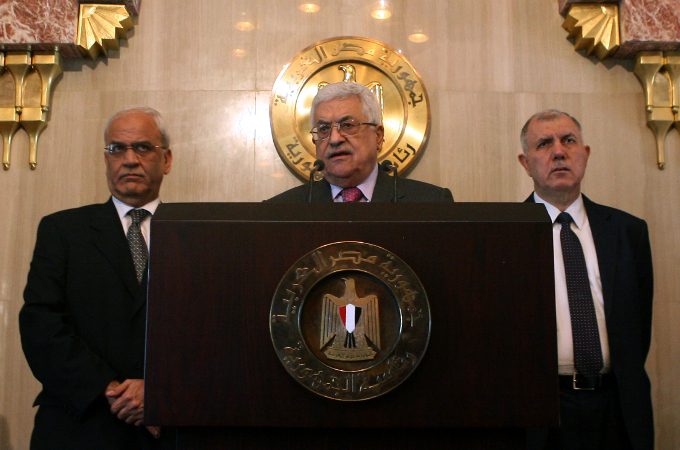The threat of a one-state solution
PA negotiators are increasingly proposing an idea that’s met with derision from Israelis, sharp criticism from the US.

 Erekat raised the one-state option during several 2009 meetings with US envoy George Mitchell [EPA]
Erekat raised the one-state option during several 2009 meetings with US envoy George Mitchell [EPA]Palestinian negotiators are more frequently threatening to abandon the goal of a two-state solution in their conflict with Israel and are pushing for a one-state option instead.
The Palestinian Authority (PA) is very well aware that a one-state solution constitutes a threat to Israel, and has used the threat during half a dozen meetings documented in The Palestine Papers.
Keep reading
list of 4 itemsMyanmar Army on the Ropes
Slapped: Speaking Up In Thailand
Slovakia: The Return of Fico
The two-state solution remains the conceptual basis for Israeli-Palestinian negotiations. However, as it has failed to accomplish a final agreement, Palestinian interest in a one-state solution has seemingly grown.
The one-state solution is generally presented as a nightmare scenario for Israel. The likelihood that Palestinians might one day constitute an electoral majority in a bi-national state – which is seen as inevitable – is viewed by many Israeli Jews as a threat to the ‘Jewish character’ of the country.
Quoted in a post-Annapolis interview with the Israeli daily Haaretz in November 2007, Ehud Olmert, the then-prime minister, warned of the implications of a one-state solution.
“If the day comes when the two-state solution collapses, and we face a South African-style struggle for equal voting rights (also for the Palestinians in the territories), then, as soon as that happens, the State of Israel is finished.”
The Palestine Papers reveal that from the run up to the Annapolis talks in 2007 onwards, the PA has increasingly used the one-state solution ‘threat’ during negotiations with Israeli and American officials.
In an April 2008 meeting between Tzipi Livni, the then-Israeli foreign minister, and Ahmed Qurei, the former PA prime minister, Israel proposed land-swaps that, according to the Palestinians, did not abide by the 1967 borders. When met with the one-state solution threat, Livni was quick to change her tone:
Qurei: I agreed to listen to your propositions because I thought you would come with realistic propositions. In light of these circumstances and these unrealistic propositions, I see that the only solution is a bi-national state where Moslems, Christians and Jews live together […] Is our demand for 1967 borders too much for us?
Livni: I did not say it is too much for you.
Round after round of failed peace talks and a simultaneous increase in illegal Jewish settlements have left the Palestinians desperate for an alternative solution. The one-state approach has therefore evolved from a mere threat to a serious option for many Palestinians.
At the end of 2009, an internal Palestinian memo urged the PA to develop the one-state option as a “credible alternative to the traditional two-state solution”.
On October 2, 2009, during a meeting at the State Department with George Mitchell, the US Middle East envoy, a clearly frustrated Erekat, the chief PA negotiator, began referring to the one-state solution as a so-called BATNA, or best alternative to a negotiated agreement, should settlement construction continue in the West Bank. The US, a long-time ally of Israel, urged the Palestinians to continue direct negotiations with Israel despite the continued settlement activity.
Erekat: It is the last time for the two states. My option, the BATNA, if all this goes down, is the one state.
Mitchell: That is your decision. But the fact is that you have a president [Barack Obama] committed to this issue. […] I understand the frustration and the burden of history but please don’t let this opportunity slip by.
[later]
Mitchell: I have a 6 inch folder on my desk containing all your statements on the settlement freeze, and despite that you negotiated. Now with the first president who wants to make an effort – he’s being penalised by you.
Erekat: Not me. He has Netanyahu [Israeli prime minister]. He came to Cairo and said full freeze. We will not convert to Judaism, so if Netanyahu’s charade of two states is followed, it’s going to be one state.
Erekat’s meeting with Robert Serry, the UN special envoy to the PA, on October 13, 2009, was a clear indicator of the frustration within the Palestinian leadership:
Erekat: I told the Americans, if you take me down this process, you will do the following: you will crown Netanyahu king for years; you will doom even Sharon’s line [former prime minister]; you will kill Livni; we enter negotiations, then Bibi [Netanyahu] announces building in Jerusalem, and the negotiations collapse. I asked them for a change of approach. This time there is absolutely no force on earth that will push us down this path. I told them we have our BATNA. We will not repeat what Arafat did. We will continue to maintain security, one authority, one gun, rule of law, but we will demand equal rights in one state…
Within the same month, on October 21, Erekat repeated his threat to Mitchell to opt for the one-state solution if Israel continued to build illegal settlements on Palestinian land.
Erekat: We know what it take[s], after 19 years. They [the Israelis] cannot decide if they want two states. They want to keep settling in the areas of my state.
Mitchell: But they will settle more if you continue this way.
Erekat: Then we announce the one state and the struggle for equality in the state of Israel. If our state will not be viable and will have the wall we will fight against apartheid. You either have a decision for peace or a decision for settlements. You cannot have both.
Mitchell responded by warning Erekat that a push for a bi-national state would cause the US government to abandon its role as a mediator between Israel and the Palestinian Authority.
Mitchell: You’ve expressed your frustration over the last 19 years. But I tell you there has never been a president on this issue like this one. You are denying him the opportunity to create the state that you want. By saying one state you are telling him to get out […].
Despite both peoples’ majority preference for separation – an Israeli state, and a contiguous Palestinian state in the West Bank and Gaza – support for the one-state option is seen to be on the rise.
A poll released in April 2010 by the Jerusalem Media and Communication Centre, for example, found 34 per cent support for a bi-national state, up from 21 per cent in June 2009. An October 2010 pollf from the Palestine Center for Policy and Survey Research found 27 per cent support for a one-state option, up from 23 per cent in May 2009.
In 2003, Muammar Qadafi wasone of the first Arab leaders to publicly endorse a one-state solution, which he named ‘Isratine’ [a combination of the words ‘Israel’ and ‘Palestine’]. Qadafi argued that a two-state option would create unacceptable security hazards for Israel on the one hand, and would do little to address the issue of the Palestinian refugees on the other.
The ‘Isratine’ proposal may have seemed far-fetched at the time; however, with the recent Israeli announcements of yet more illegal settlement construction in the West Bank, and given the current status of the so-called peace process, Qadafi’s vision of a single state for Palestinians and Israelis seems ever the more imminent.


